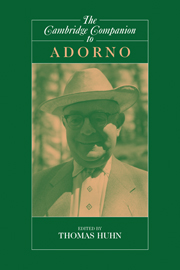Book contents
- Frontmatter
- Introduction: Thoughts beside Themselves
- 1 Negative Dialectic as Fate
- 2 Weighty Objects
- 3 Adorno, Marx, Materialism
- 4 Leaving Home
- 5 Is Experience Still in Crisis? Reflections on a Frankfurt School Lament
- 6 Mephistopheles in Hollywood
- 7 Right Listening and a New Type of Human Being
- 8 Authenticity and Failure in Adorno’s Aesthetics of Music
- 9 Dissonant Works and the Listening Public
- 10 Adorno, Heidegger, and the Meaning of Music
- 11 The Critical Theory of Society as Reflexive Sociology
- 12 Genealogy and Critique
- 13 Adorno’s Negative Moral Philosophy
- 14 Adorno’s Social Lyric, and Literary Criticism Today
- 15 Adorno’s Tom Sawyer Opera Singspiel
- Select Bibliography
- Index
11 - The Critical Theory of Society as Reflexive Sociology
Published online by Cambridge University Press: 28 May 2006
- Frontmatter
- Introduction: Thoughts beside Themselves
- 1 Negative Dialectic as Fate
- 2 Weighty Objects
- 3 Adorno, Marx, Materialism
- 4 Leaving Home
- 5 Is Experience Still in Crisis? Reflections on a Frankfurt School Lament
- 6 Mephistopheles in Hollywood
- 7 Right Listening and a New Type of Human Being
- 8 Authenticity and Failure in Adorno’s Aesthetics of Music
- 9 Dissonant Works and the Listening Public
- 10 Adorno, Heidegger, and the Meaning of Music
- 11 The Critical Theory of Society as Reflexive Sociology
- 12 Genealogy and Critique
- 13 Adorno’s Negative Moral Philosophy
- 14 Adorno’s Social Lyric, and Literary Criticism Today
- 15 Adorno’s Tom Sawyer Opera Singspiel
- Select Bibliography
- Index
Summary
In the course of developing his critical theory of society - a project whose philosophical foundations were first explicitly outlined by Max Horkheimer in a programmatic 1937 essay in the Zeitschrift für Sozialforschung - Theodor W. Adorno came to formulate his unique concept of sociology. The formulation is the result of a process of learning and reflection whose point of departure is the attempt to make sense of the mutually conditioning relations between music and society. The importance of music theory in Adorno's sociology is also to be explained from the biographical fact that, though Adorno studied philosophy in Frankfurt am Main at the beginning of the 1920s, his heart had been bent on music from childhood. (Adorno studied composition with Alban Berg in Vienna in 1925.) Adorno's abilities as a composer influenced not only his numerous published opera and concert reviews but also his music-aesthetic analyses of individual works. These two areas of interest have in common that both were engaged in discerning the transformation of musical material amid changes in society.
- Type
- Chapter
- Information
- The Cambridge Companion to Adorno , pp. 279 - 301Publisher: Cambridge University PressPrint publication year: 2004
- 3
- Cited by

